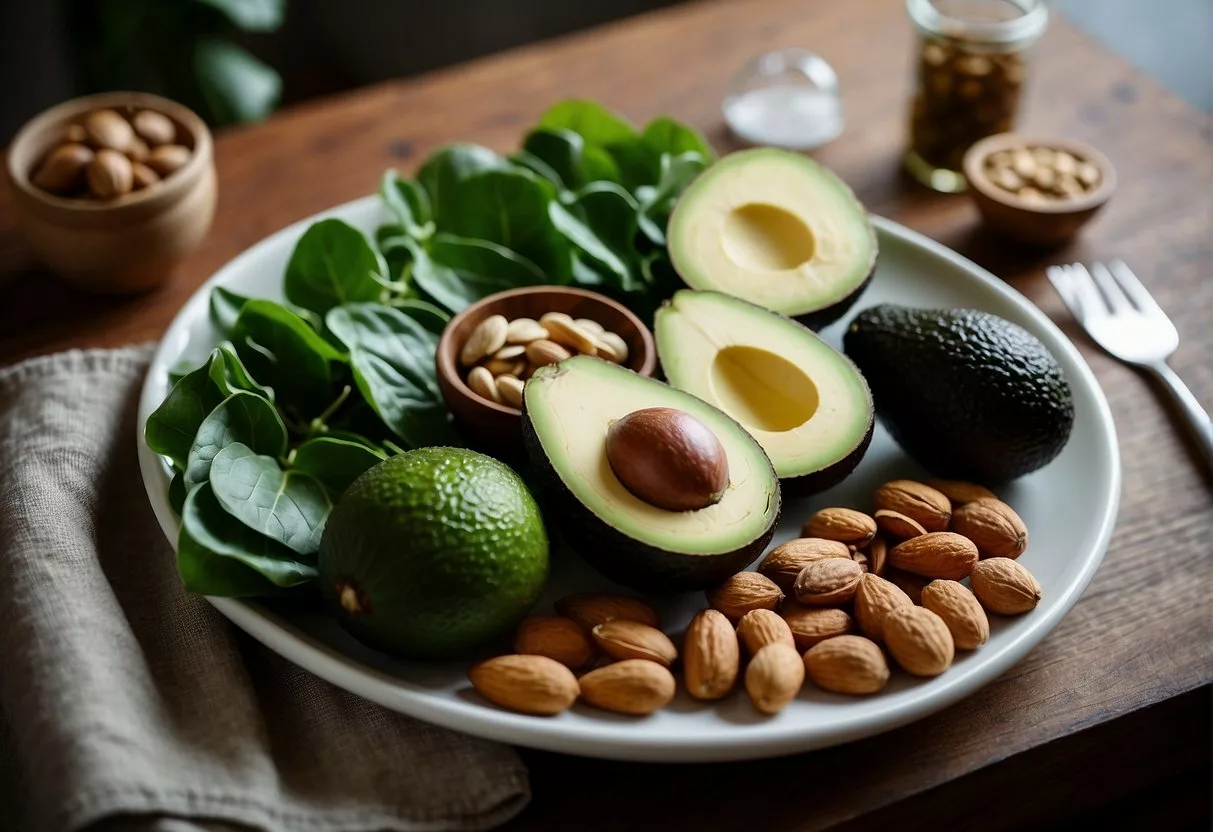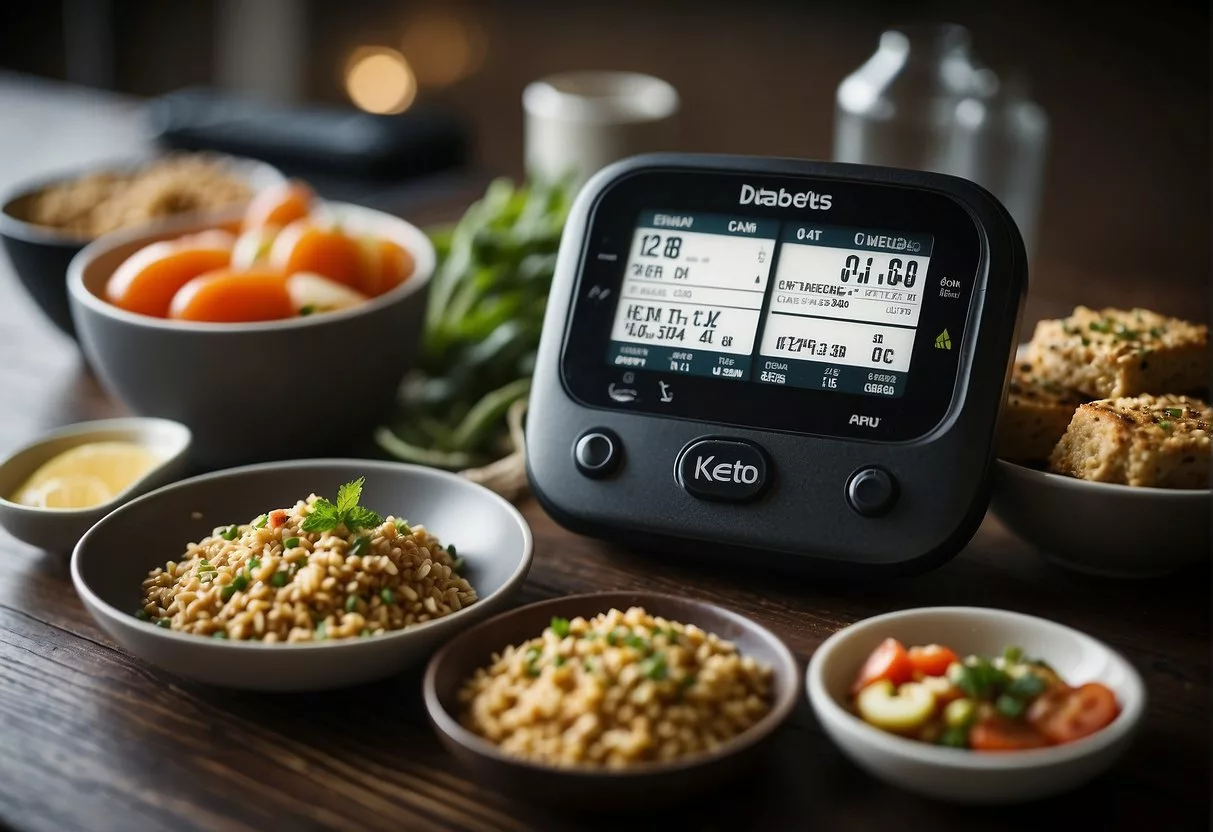When evaluating dietary approaches to managing diabetes, the keto and vegan diets are often discussed due to their contrasting nutritional philosophies.
The keto diet emphasizes high-fat, moderate-protein, and low-carbohydrate intake, positioning the body to burn fat for fuel, a state known as ketosis. Proponents suggest it may help control blood sugar levels by reducing carbohydrate intake.
 [1]
[1]Introducing Sugar Defender[2], an advanced blend of 24 proven ingredients that support healthy glucose levels and natural weight loss.
On the other hand, a vegan diet excludes all animal products and focuses on plant-based foods, which can be higher in carbohydrates but also rich in fiber and essential nutrients.
Finding the optimal diet for diabetes management is complex as it requires consideration of individual health goals, metabolic responses, and preferences. A comprehensive comparison for diabetes[4] might reveal potential benefits and limitations of each diet.
Research and guidelines suggest that both diets could improve glycemic control, but they operate through different mechanisms and nutrient profiles.
Key Takeaways
- Keto and vegan diets offer distinct approaches to managing diabetes, focusing on fat and plant-based nutrition, respectively.
- Choosing the right diet for diabetes management involves evaluating individual health needs and dietary preferences.
- Both diets can be effective, but require careful planning to meet nutritional needs and manage blood sugar levels.
Understanding Diabetes
Diabetes is a chronic condition characterized by elevated levels of glucose in the blood. The management of this condition primarily hinges on the regulation of blood sugar, for which diet plays a crucial role.
The Role of Diet in Diabetes Management
Diet is fundamental in managing diabetes because it directly affects blood sugar and insulin levels. For individuals with diabetes, the goal is to maintain stable blood glucose levels to minimize the risk of complications. The following lists key dietary considerations in diabetes management:
- Carbohydrate intake: Quality and quantity of carbohydrates consumed can influence blood sugar.
- Meal timing: Regular meal schedules can help stabilize glucose levels.
- Macronutrient balance: A balance of carbohydrates, proteins, and fats is essential.
Type 1 vs Type 2 Diabetes
Diabetes comes primarily in two forms: Type 1 and Type 2, each with different causes and management strategies.
- Type 1 Diabetes: An autoimmune condition where the pancreas produces little to no insulin. Management typically requires lifelong insulin therapy.
- Type 2 Diabetes: Characterized by insulin resistance where the body does not effectively use the insulin it produces. It’s often managed through diet, exercise, medication, and sometimes insulin supplementation.
Basics of the Ketogenic Diet

The ketogenic diet is a low-carb, high-fat diet designed to stimulate the production of ketones in the liver, which are used as energy in place of glucose.
Principles of Keto
The fundamental principle of the ketogenic diet is to reduce the carbohydrate intake and replace it with fat. This drastic reduction in carbs puts the body into a metabolic state called ketosis, where fat from the diet and the body is burned for energy. Ketones are by-products of this process and serve as an alternate energy source for the brain and other cells.
What to Eat on a Keto Diet
Individuals following a ketogenic diet consume:
- Meats: beef, pork, poultry, and fatty fish
- High-Fat Dairy: butter, cream, and cheese
- Nuts and Seeds: almond, walnuts, flaxseeds
- Healthy Oils: primarily extra virgin olive oil, coconut oil, and avocado oil
- Low-Carb Vegetables: most green veggies, tomatoes, onions
- Avocados: whole avocados or freshly made guacamole
- Eggs: preferably pastured or omega-3 whole eggs
They avoid high-carb foods like grains, sugars, legumes, rice, potatoes, candy, juice, and most fruits.
Nutrient Considerations in Keto

When embarking on a ketogenic diet for diabetes management, understanding the roles and balance of macronutrients is crucial. It focuses on fats and proteins while drastically reducing carbohydrate intake to maintain ketosis.
Fats and Proteins
Fats are the mainstay of the ketogenic diet, providing up to 70-80% of total daily calories. Healthy fats, such as those from avocados and nuts, are encouraged. These food sources not only offer energy but also help in the absorption of fat-soluble vitamins. One must be mindful of saturated fat intake; while it’s a part of the diet, excessive consumption can be concerning for heart health.
Table: Recommended Sources of Fats on Keto
| Type of Fat | Food Sources |
|---|---|
| Saturated | Butter, Coconut oil, Red meat |
| Unsaturated | Olive oil, Avocado, Nuts and seeds, Fatty fish |
Proteins are also essential, typically making up about 20% of a ketogenic diet. Adequate protein supports muscle mass and repair. It’s crucial to choose high-quality protein sources like grass-fed meat, free-range eggs, and wild-caught fish.
Carbohydrates and Keto-Friendly Substitutes
Carbohydrates are significantly reduced on a ketogenic diet, generally to 20-50 grams per day. This limits traditional sources like grains, starches, and sugars, making room for fiber-rich, low-net carb alternatives that are essential for digestive health and maintaining a feeling of fullness.
Keto-friendly Carbohydrate Substitutes
- Vegetables: Spinach, broccoli, and cauliflower are low in net carbs but rich in micronutrients and fiber.
- Fruits: Berries are great options providing vitamins, antioxidants, and fiber while keeping carbs low.
- Flour substitutes: Almond flour and coconut flour replace traditional flours for baking without the high carbohydrate count.
It is important to focus on nutrient-dense, minimally processed foods to avoid vitamin and mineral deficiencies while following a ketogenic diet for diabetes control.
Keto Diet and Diabetes

The ketogenic diet is a low-carbohydrate, high-fat diet that has been associated with improvements in blood sugar control and insulin sensitivity in individuals with diabetes.
Impact of Keto on Blood Sugar Levels
The ketogenic diet drastically reduces carbohydrate intake, instead focusing on fats, which leads to a state of ketosis. During ketosis, the body burns fat for fuel, which can result in lower blood sugar levels. Studies have suggested that this low-carbohydrate approach may lead to more stable blood glucose levels, which is a critical element in the management of diabetes.
Ketogenic Diet and Insulin Sensitivity
By limiting carbohydrates, the ketogenic diet can help to reduce the body’s demand for insulin. This reduction can enhance insulin sensitivity, which is beneficial for individuals with type 2 diabetes. As insulin sensitivity improves, the body becomes more efficient at using glucose, which can further aid in the management of diabetes.
Basics of the Vegan Diet

The vegan diet eliminates all animal products and focuses on plant-based foods. It’s rooted in principles of animal welfare, environmental sustainability, and health.
Principles of Veganism
Veganism is more than a diet; it’s a lifestyle choice that excludes the use of animal products for ethical, environmental, and health reasons. Individuals following a vegan diet abstain from consuming any animal-derived foods, which includes meat, dairy, eggs, and honey.
What to Eat on a Vegan Diet
A balanced vegan diet includes a variety of vegetables, fruits, whole grains, legumes, nuts, and seeds. Here are some specifics:
- Vegetables: They are the cornerstone of a vegan diet. One should aim for a variety, including leafy greens, cruciferous vegetables like broccoli and cauliflower, and root vegetables such as carrots and sweet potatoes.
- Fruits: Fresh, frozen, or dried fruits without added sugars are essential to provide vital vitamins and antioxidants.
- Whole grains: These are crucial for providing fiber and nutrients. Examples include brown rice, quinoa, barley, and whole-wheat products.
- Legumes: Beans, lentils, and peas offer protein, fiber, and minerals.
- Nuts and seeds: These are good sources of healthy fats, proteins, and other nutrients. Flaxseeds, chia seeds, almonds, and walnuts are some examples.
By emphasizing these plant-based foods, a vegan diet aims to cover all nutritional needs while promoting a sustainable and ethical lifestyle.
Nutrient Considerations in Veganism

Adopting a vegan diet requires careful planning to ensure adequate nutrient intake, particularly where certain nutrients are typically abundant in animal-derived foods. This section will explore the key considerations regarding protein, iron, calcium, vitamin D, and vitamin B12 in a vegan diet.
Protein Sources
Vegan diets must include a variety of plant-based proteins to meet daily requirements.
Legumes such as lentils and beans, nuts, seeds, and whole grains are excellent sources.
For instance, tofu contains approximately 20 grams of protein per cup, making it a staple in many vegan diets.
Additionally, tempeh and legumes are valuable for their high protein content, with 15 grams per ½ cup of tempeh and about 14 grams per cup for legumes.
Vitamins and Minerals
It is crucial for individuals following a vegan diet to be mindful of certain vitamins and minerals that may be lacking.
- iron: Although iron is found in plant-based sources like spinach, it is non-heme iron, which is less readily absorbed by the body compared to heme iron from animal products. Consuming vitamin C-rich foods can enhance absorption.
- Calcium: Essential for bone health, calcium can be sourced from fortified plant milks, tofu, and leafy green vegetables.
- Vitamin D: Often obtained through sunlight exposure, vitamin D can also be found in fortified foods and supplements to ensure adequate levels.
- Vitamin B12: As it’s not naturally present in plant foods, vitamin B12 must be sourced from fortified foods or supplements to avoid deficiency.
Vegan Diet and Diabetes

The adoption of a vegan diet can lead to significant effects on diabetes management. Specifically, it influences blood sugar levels and insulin resistance due to its high fiber content and plant-based composition.
Impact of Vegan Diet on Blood Sugar
A vegan diet, which excludes all animal products, relies heavily on fruits, vegetables, legumes, and whole grains—all of which are natural sources of fiber.
Fiber plays a critical role in blood sugar management by slowing the absorption of sugar into the bloodstream, thereby preventing rapid spikes in glucose levels.
Research summarized by health organizations[5] describes how a plant-based diet can improve glycemic control in individuals with type 2 diabetes.
One’s diet to manage diabetes successfully often includes a wide variety of high-fiber foods. Here is a brief overview of daily dietary choices one might make:
- Breakfast: Oatmeal topped with berries and flaxseeds
- Lunch: Quinoa salad with mixed vegetables and chickpeas
- Dinner: Lentil curry with broccoli and brown rice
Vegan Diet and Insulin Resistance
Insulin resistance is a condition where the body’s cells do not respond properly to insulin, which can lead to type 2 diabetes.
A vegan diet not only helps in maintaining a healthy weight but is also rich in plant-based nutrients that enhance insulin sensitivity.
A comprehensive review indicates that by focusing on whole, unprocessed foods, a vegan diet may contribute to the improvement of insulin resistance.
In particular, legumes like beans and lentils, integral to a vegan diet, are associated with improved insulin response due to their low glycemic index and nutrient density.
Some staple vegan foods that can support insulin sensitivity include:
- Nuts and seeds: Almonds, walnuts, and chia seeds
- Legumes: Black beans, lentils, and peas
- Whole grains: Barley, oatmeal, and brown rice
Comparative Analysis of Keto and Vegan Diets for Diabetes

When considering dietary approaches for managing diabetes, the impact on weight management and long-term health outcomes are central to the analysis.
Both ketogenic (keto) and vegan diets have unique characteristics that influence these aspects for individuals with diabetes.
Weight Management
The ketogenic diet, which emphasizes a high-fat, moderate-protein, and low-carbohydrate intake, is known for its potential to induce weight loss by shifting the body’s metabolism towards fat utilization.
Studies indicate that a keto diet may lead to a significant reduction in body weight, which can be beneficial for individuals with obesity and Type 2 diabetes.
The effective weight loss associated with this dietary approach may result in improved glycemic control, as evidenced by the A1c levels observed in individuals following a ketogenic diet[5].
In contrast, a whole food plant-based or vegan diet also has the potential to facilitate weight loss, notably through lower calorie and carbohydrate intake.
The emphasis on high-fiber foods, such as fruits, vegetables, and legumes, contributes to satiety and reduces overall caloric consumption, which can contribute to weight loss.
Long-Term Health Outcomes
The long-term health outcomes of dietary interventions in diabetes management extend beyond glycemic control.
A vegan diet has been associated with a reduced risk of heart disease, largely due to a decrease in saturated fat intake and an increase in dietary fiber.
The plant-based nature of the diet may also contribute to longevity and improved health outcomes, with some evidence suggesting a vegan diet can lower the risk of developing diabetes, as seen in an analysis of long-term studies[6].
Meanwhile, the ketogenic diet, while effective for weight loss, poses considerations regarding heart health due to its high-fat intake, which typically includes a substantial amount of saturated fat.
However, when carefully planned, a keto diet can include healthier fats that may not significantly increase the risk of heart disease. The impact of a long-term ketogenic diet on heart health and longevity requires further study to make definitive conclusions.
Health and Nutritional Challenges

When adopting either a ketogenic or vegan diet for diabetes management, it’s imperative to consider certain health and nutritional challenges. Each diet presents unique risks for deficiencies and misunderstandings about their impacts on health.
Potential Deficiencies and Solutions
Ketogenic Diet:
- Nutrient Deficiencies: This diet may result in low intake of certain nutrients like fiber and some vitamins due to the restriction of certain food groups.For instance, reduced consumption of fruits and whole grains can mean lower levels of vitamins C and D, as well as phosphorus. Individuals may need to incorporate keto-friendly sources that are high in these nutrients or discuss supplementation with a healthcare provider.
- Solutions: Including a variety of low-carb vegetables, nuts, and seeds can help mitigate these deficiencies. For example, spinach and almonds can provide fiber, while mushrooms exposed to sunlight offer vitamin D.
Vegan Diet:
- Nutrient Deficiencies: Those following a vegan diet might be at risk for deficiencies in vitamin B12, iron, calcium, and omega-3 fatty acids, as these are commonly found in animal products. Cholesterol levels often improve on a vegan diet, but attention is needed to ensure adequate intake of healthy fats.
- Solutions: Incorporating fortified foods or supplements is essential for nutrients like B12.Plant sources rich in other nutrients include chia seeds for omega-3s, tofu for calcium, and lentils for iron.
Addressing Common Misconceptions
Ketogenic Diet Misconceptions:
- Cholesterol Concerns: The ketogenic diet is high in fats, which raises concerns about cholesterol levels. However, research suggests that when executed mindfully, it can increase HDL (good cholesterol) and doesn’t necessarily elevate LDL (bad cholesterol).
- Healthy Fats: There’s a misconception that all fats on the keto diet are equal, but the focus should be on healthy fats. Avocado and olive oil are two examples of fats that can support a healthy heart.
Vegan Diet Misconceptions:
- Protein Deficiency: A common misconception is that vegan diets offer insufficient protein. However, with careful planning, one can meet their protein needs through plant-based sources such as legumes, nuts, and seeds.
- Nutrient Quality: Some believe that nutrients from plant-based sources are inferior to those from animal products. While the bioavailability of certain nutrients may vary, the proper combination of plant foods can still provide a well-rounded nutrient profile.
Lifestyle Considerations and Sustainability

When choosing between a ketogenic and a vegan diet for diabetes management, individuals must consider the long-term sustainability of each diet and their environmental impacts.
Adherence to a meal plan and the practicality of the diet in daily life are also crucial for consistent health benefits.
Environmental Impact
The ketogenic diet, emphasizing high-fat and protein intake, often leads to increased consumption of animal products. Research suggests that animal agriculture is associated with higher greenhouse gas emissions, water usage, and land use.
Choosing a diet lower in animal products, like a vegan diet, may have a lesser environmental footprint. Diets rich in plant-based foods generally use fewer natural resources and are considered more sustainable for the environment.
Practicality and Adherence
A person’s ability to stick to a diet is influenced by various factors, including the accessibility of meal plans, availability of specific foods, and how much meal preparation is required.
Processed foods are readily available in both ketogenic and vegan options; however, they may not be optimal for those managing diabetes due to their potential impact on blood sugar levels.
A meal plan focusing on whole foods may enhance sustainability and health outcomes.
A vegan diet might offer a wider variety of natural, unprocessed foods, which could aid individuals in reducing processed food intake.
Individuals considering the ketogenic diet often find it challenging to maintain due to the strict limitations on carbohydrate intake, which might affect adherence over time.
Conversely, the vegan diet may present its own challenges in terms of ensuring adequate protein intake and vitamin B12, which is naturally found in animal products.
Expert Opinions and Guidelines

Evaluating dietary choices for diabetes management draws on a wealth of expert guidance. This section delves into both dietitian recommendations and medical research findings to provide a comprehensive viewpoint on the vegan and ketogenic diets.
Dietitian Recommendations
Registered dietitians emphasize the importance of individualized nutritional advice, but some general guidelines have emerged.
For instance, plant-based diets, including veganism, are often recommended for their high fiber content and low levels of saturated fats which can aid in blood sugar regulation.
Dietitians stress monitoring essential nutrients intake, such as vitamin B12, when following a strict vegan diet for diabetes management.
It’s crucial that individuals consult with a registered dietitian who can offer personalized advice that takes into account their overall health and dietary needs.
On the ketogenic front, dietitians recognize that while the diet can lead to weight loss and potential blood sugar level improvements due to lower carbohydrate intake, its long-term effects are still being studied.
They advocate for close medical supervision when following a keto diet, particularly for diabetics, to avoid any adverse effects such as nutrient deficiencies or the exacerbation of existing health conditions.
Medical Research Findings
Medical research sheds light on how diets impact diabetes.
Studies have found that low-fat, plant-based diets can lead to improvements in glycemic control and cardiovascular risk factors.
Research also indicates potential benefits of ketogenic diets for type 2 diabetes, showing improvements in HbA1c levels and weight loss in the short term. However, the long-term sustainability and health outcomes associated with a keto diet require further investigation.
The American Diabetes Association (ADA) has not endorsed any one specific diet but provides guidelines that accommodate individual nutrition therapy.
They encourage a variety of eating patterns that are adaptable to an individual’s needs and have included both plant-based and low-carbohydrate diets as options in the management of diabetes.
Conclusion

In managing diabetes, dietary choices play a critical role. Both the keto diet and the vegan diet have unique benefits and limitations that individuals must consider.
The keto diet emphasizes high fat and low carbohydrate intake, which can lead to rapid initial weight loss and improvement in glycemic control. Studies have shown its effectiveness in reducing A1c levels, which is a significant marker for diabetes management. However, it may pose risks such as nutrient deficiencies due to a limited intake of certain fruits and vegetables and potential increase in cholesterol levels.
On the other hand, the vegan diet focuses on plant-based foods, which are naturally high in fiber, vitamins, and minerals. It has been associated with a decrease in the risk of chronic conditions like heart disease and has demonstrated benefits in long-term weight management. Yet, adherence to this diet requires careful planning to ensure adequate intake of essential nutrients often found in animal products, such as vitamin B12 and iron.
When considering both diets, it is important to understand:
- The keto diet may provide quicker results in weight and A1c level reduction, but requires vigilance regarding heart health and nutrient intake.
- The vegan diet supports overall health and is sustainable long-term, but necessitates a structured approach to meet all nutritional needs.
Frequently Asked Questions

In this section, we explore common inquiries regarding how different diets, specifically ketogenic and plant-based diets, impact individuals with diabetes. We examine potential risks, management of type 1 diabetes, effects on cholesterol, and the roles these diets play in weight loss, inflammation, and longevity.
What are the potential risks of a ketogenic diet for individuals with diabetes?
A ketogenic diet, which is high in fats and low in carbohydrates, may lead to hypoglycemia if medications are not adjusted accordingly.
Additionally, without proper supervision, this diet can result in nutritional deficiencies.
How does the ketogenic diet affect type 1 diabetes management?
For individuals with type 1 diabetes, a ketogenic diet requires meticulous monitoring of blood glucose levels and thoughtful insulin management to avoid ketoacidosis, which is a risk due to the diet’s very low carbohydrate content.
Can a ketogenic diet have negative effects on cholesterol levels in diabetics?
There’s a possibility that a ketogenic diet could raise LDL (bad) cholesterol in some individuals with diabetes due to its high saturated fat content. However, some people may experience an improvement in their lipid profile.
What are the benefits and drawbacks of a plant-based diet versus a ketogenic diet for inflammatory conditions?
A plant-based diet has been associated with reducing inflammation, attributed to high levels of antioxidants and fiber.
On the other hand, a ketogenic diet can reduce inflammation markers, but its restrictive nature could lead to nutrient deficiencies if not carefully planned.
Which diet is more effective for weight loss in diabetic patients: plant-based or keto?
Both diets have been reported to be effective for weight loss.
A plant-based diet may offer more long-term weight loss benefits, while a ketogenic diet may provide quick initial weight loss. The best choice depends on individual preferences and medical guidance.
How do ketogenic and vegan diets compare in terms of improving longevity for those with diabetes?
Some studies suggest that a low-carb diet like keto may improve glycemic control in the short term.
A balanced plant-based diet might contribute to improved longevity by mitigating risk factors for heart disease and other complications associated with diabetes.
References
- Sugar Defender. https://8e81c8fyct2y4n4c8aiki8qmct.hop.clickbank.net/?tid=ketovsvegan1 Accessed October 31, 2025
- Sugar Defender. https://8e81c8fyct2y4n4c8aiki8qmct.hop.clickbank.net/?tid=ketovsvegan2 Accessed October 31, 2025
- Sugar Defender. https://8e81c8fyct2y4n4c8aiki8qmct.hop.clickbank.net/?tid=ketovsvegan3 Accessed October 31, 2025
- Evaluating Vegan vs Keto for Diabetes: A Comprehensive Comparison. https://optimisingnutrition.com/vegan-vs-keto/ Accessed October 31, 2025
- health organizations. https://health.ucdavis.edu/nursing/news/Events/PDF/Other_presentations/A1c%20Levels%20A%20Comparison%20of%20Plant-Based%20vs.%20Ketogenic%20Diets%20in%20Type%202%20Diabetes.pdf Accessed October 31, 2025
- A Comparison of Ketogenic versus Plant-Based Diet and its Effects on Glucose and Insulin Response in Type 2 Diabetics. https://thepadoctor.com/ketogenic-vs-plant-based-diet-in-type-2-diabetes/ Accessed October 31, 2025
